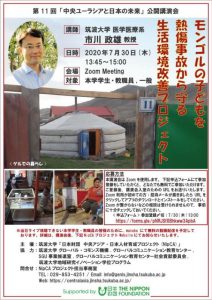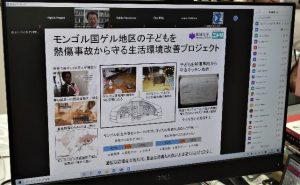As part of its ongoing activities, the NipCA Project holds a series of public lectures under the title “Future of Central Eurasia and Japan”.
On July 30, 2020 (Thu.), we invited Professor Masao Ichikawa of the Faculty of Medicine of the University of Tsukuba to deliver the 11th lecture in the series: “The Project for Protecting Mongolian Children from Burn Accidents by Improving Their Living Conditions”. Although this academic year’s lectures are conducted via Zoom due to the spread of coronavirus disease, around 50 people attended Prof. Ichikawa’s lecture: among them not only students, faculty, and staff, but also members of the general public.
Prof. Ichikawa, who has been interested in the problems of development since his teenage years and now assesses the effectiveness of policies for safe and healthy living, presented his view on the problem of severe child burn accidents in Mongolia and introduced a project aimed to prevent them.
In recent years, child death rates from burn injuries in Mongolia have soared, and are now among the highest globally. Nevertheless, both the reasons for this and the possible countermeasures had remained unknown. Prof. Ichikawa explained how, under such conditions, he engaged in the task of preventing severe burn accidents by carrying out baseline surveys, cause analysis, policy planning, and prototype design and production. He also described the problems he encountered in the process.

The conducted surveys made it clear that severe burn accidents were due to the recent spread of electric cooking appliances, and the possible solution lay in producing and distributing such furniture that would make the cooking appliances inaccessible to children. Prof. Ichikawa made a compelling case for this solution as one that could reduce the number of accidents. On the other hand, his lecture made the audience think of the difficulties in implementing development projects by mentioning such problems as procuring the funding necessary for the furniture distribution and securing its sustainability. At the Q&A session after the lecture, many audience members offered their own ideas and advice with the hope of helping resolve those problems.
This lecture was broadcast on Manaba from August 19 to August 31.



